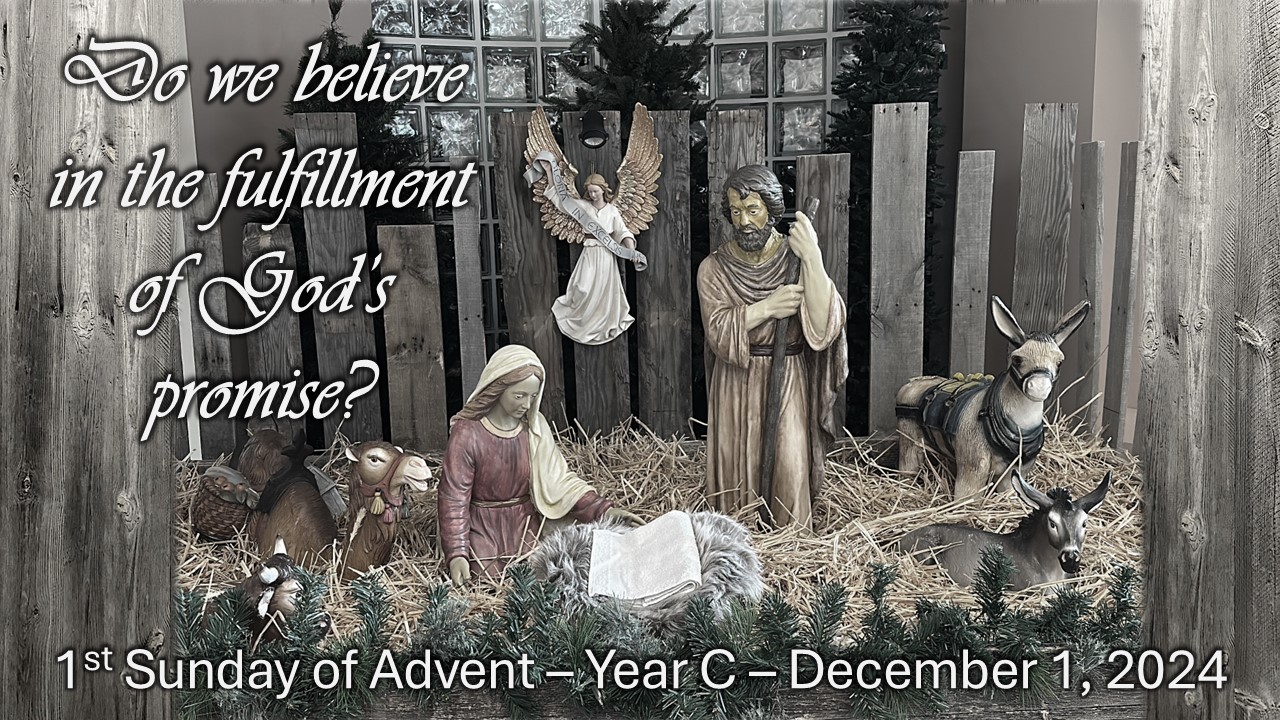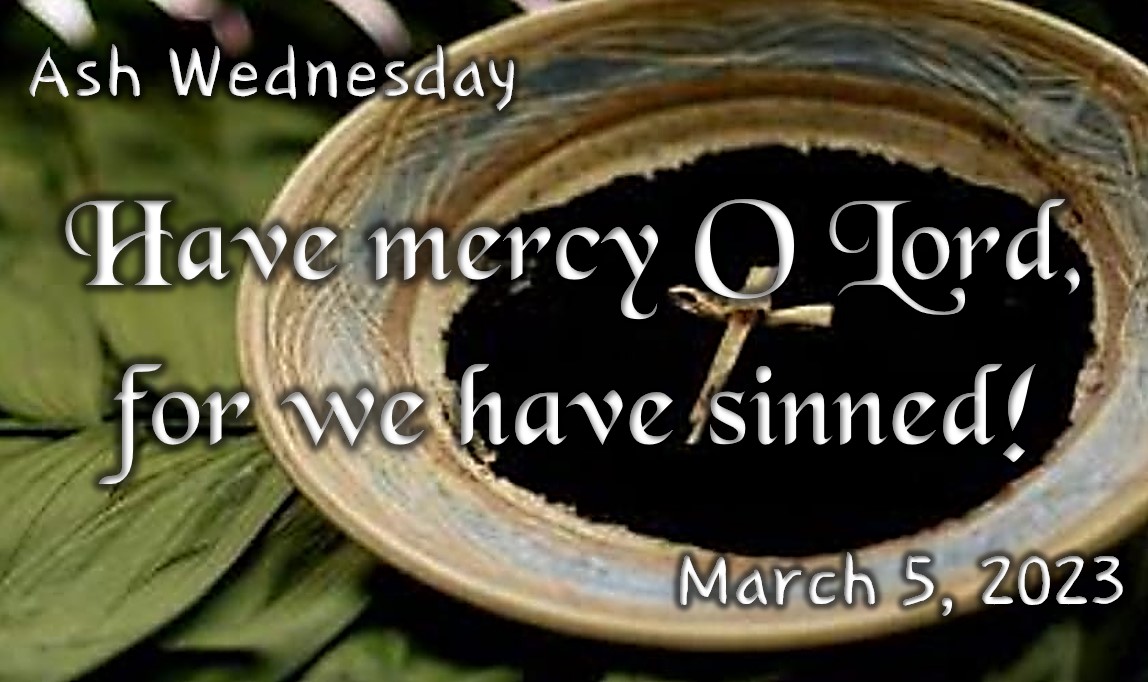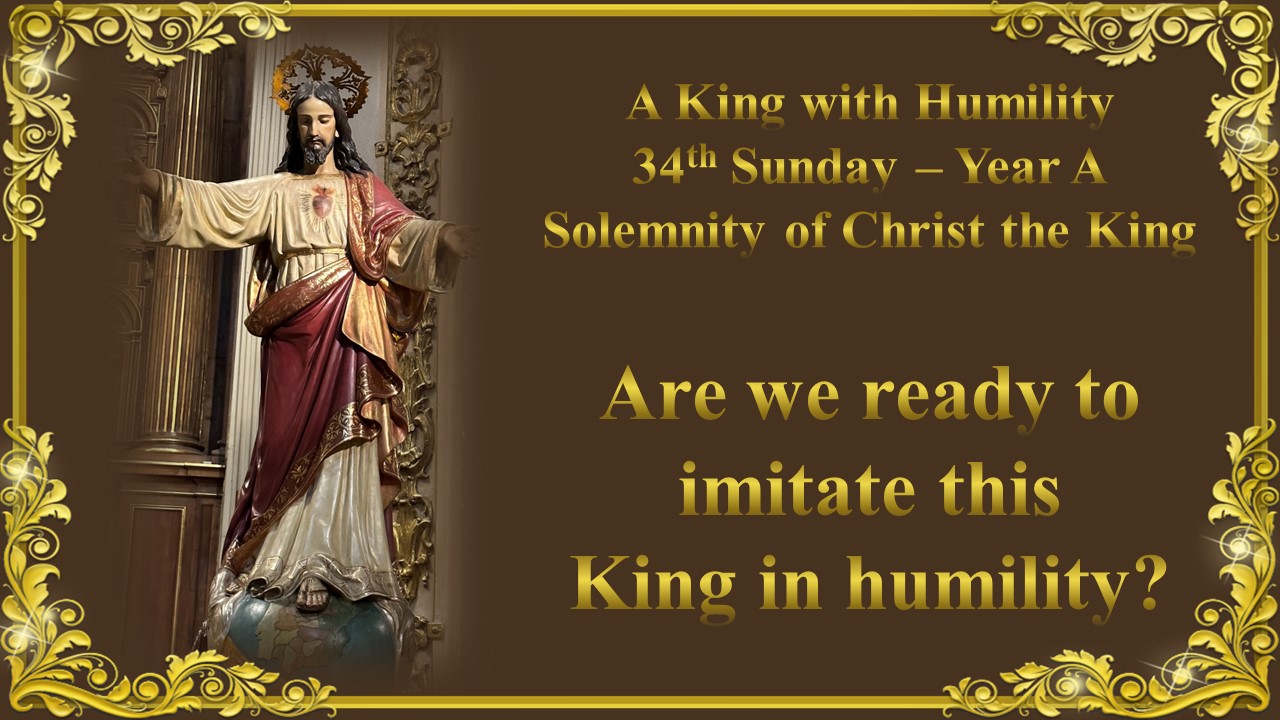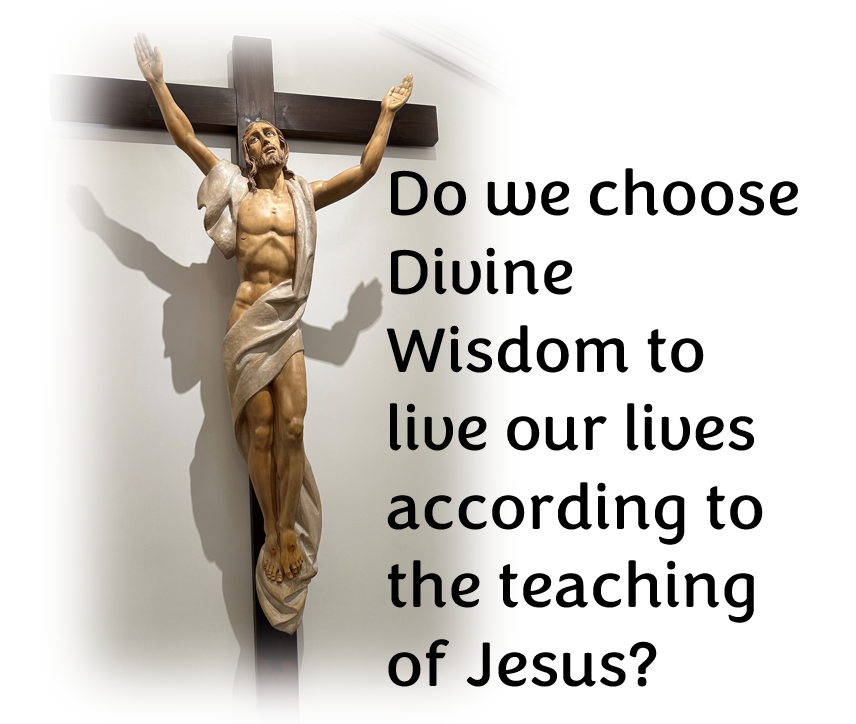
1ST SUNDAY OF ADVENT YEAR C ~ DECEMBER 1, 2024
FULFILLMENT OF THE PROMISE
As we begin our new liturgical year and season of Advent, the First Reading is right on spot “the days are surely coming, says the Lord, when I will fulfill the promise, I made to the house of Israel and the house of Judah”. Advent is the period of four Sundays and weeks before Christmas. Advent means ‘Coming’ in Latin (advenio) means “the coming.” Not “he came” but “the coming.” It has an idea of a constancy in it and not just arrival at one time and not at another. If we look at the whole Old Testament and we look at the readings, we can understand what this means.
During Advent we do not just live in anticipation of Christmas; we are also called to rekindle the anticipation of the glorious return of Christ, when he will return at the end of time, preparing ourselves, with consistent and courageous choices, for the final encounter with him. We remember Christmas, we await the glorious return of Christ, and our personal encounter: the day in which the Lord will call. During these four weeks we are called to leave behind a resigned and routine way of life and to go forth, nourishing hope, nourishing dreams for a new future.
St. Marcarius, Bishop, during one of his homilies said “When God was displeased with the Jews, he delivered Jerusalem to the enemy, and they were conquered by those who hated them; there were no more sacrifices or feasts. Likewise angered at a soul who had broken his commands, God handed him over to his enemies, who corrupted and totally dishonored it. When a house has no master living in it, it becomes dark, vile and contemptible, choked with filth and disgusting refuse. So too is a soul which has lost its master, who once rejoiced there with his angels. This soul is darkened with sin, its desires are degraded, and it knows nothing but shame.
Woe to the path that is not walked on, or along which the voices of men are not heard, for then it becomes the haunt of wild animals. Woe to the soul if the Lord does not walk within it to banish with his voice the spiritual beasts of sin. Woe to the house where no master dwells, to the field where no farmer works, to the pilotless ship, storm-tossed and sinking. Woe to the soul without Christ as its true pilot; drifting in the darkness, buffeted by the waves of passion, storm-tossed at the mercy of evil spirits, its end is destruction. Woe to the soul that does not have Christ to cultivate it with care to produce the good fruit of the Holy Spirit. Left to itself, it is choked with thorns and thistles; instead of fruit it produces only what is fit for burning. Woe to the soul that does not have Christ dwelling in it; deserted and foul with the filth of its passions, it becomes a haven for all the vices.
When a farmer prepares to till the soil, he must put on clothing and use tools that are suitable for the job. So, Christ, our heavenly king, came to till the soil of mankind devastated by sin. He assumed a body and, using the cross as his ploughshare, cultivated the barren soul of man. He removed the thorns and thistles which are the evil spirits and pulled up the weeds of sin. Into the fire he cast the straw of wickedness. And when he had ploughed the soul with the wood of the cross, he planted in it a most lovely garden of the Spirit, that could produce for its Lord and God the sweetest and most pleasant fruit of every kind.”
“Keep Christ in Christmas” is a beautiful reminder to keep our relationship strong and pure with the Lord. God is true to his promise, and he will fulfill everything in its time.
The First Coming, of course, is the coming of the child, the coming of the Saviour, the coming of Emmanuel, God with us, and he comes in Bethlehem, and this is an historical coming. But what makes this so much more important is the longing and the hope that the children of Israel brought down through the centuries, two thousand years ago, beginning with Abraham and all the way to when Joseph and Mary went to the little village, the little town of Bethlehem, the seat of King David of olden days, and there was born the child. The First Coming is God comes in weakness, God comes in the quiet of the night, God comes like a helpless child, in need of men and women to take care of him, to watch over him, to feed him, to do all these unbelievable things when you think that the Blessed Mother and Joseph are raising a child who is God Himself. And so, this coming is well worth all the effort we put in to celebrate.
It is the custom to kind of downplay the commercial side of Christmas, but everybody knows that seeing through the commercial side of Christmas is the gift of God, His Son, the gift of God who comes himself, weak, helpless and needy, that we might know that in the mystery of God there is a great yearning to experience the way that we experience, to feel the things that a human being feels and to become one with us. It is as if he comes all the way down from the highest of heaven and from now on, he has come and he has come to stay and he continues to be with us.
The Second Coming is more dramatic. The Second Coming is the end of the world.
This is the coming of Jesus into the world. These four Sundays of Advent speak about four Gospel values: Hope, Peace, Joy and Love. Each Sunday one candle is lit which symbolizes the light of Christ because Jesus is our Light and we need to walk in the light of Christ. The liturgical color during Advent is Purple which is the symbol of hope in the second coming of Christ and Repentance. The season of Advent has two main parts: First two week will focus on the 2nd coming of Jesus and the other two weeks will remind us about his first coming how he was prophesied in the Bible and how his birth took place.
Many years ago, an old man stood on a Virginia riverbank. He was waiting to cross the river and, since it was bitterly cold and there were no bridges, he was hoping to get a ride across on horseback. After a lengthy wait he spotted a group of horsemen approaching. He let the first one pass, then the second, third, fourth and fifth. One rider remained. As he drew abreast, the old man looked him in the eye and said, ‘Sir, would you give me a ride across the river?’
The rider immediately replied, ‘Certainly.’ Once across the river, the old man slid to the ground. ‘Sir,’ the rider said before leaving. ‘I could not help but notice that you permitted all the other men to pass without asking for a ride. Then, when I drew abreast, you immediately asked me to carry you across. I am curious as to why you didn’t ask them, and you did ask me.’
The old man quietly responded, ‘I looked into their eyes and could see no love and knew in my own heart it would be useless to ask for a ride. But when I looked into your eyes, I saw compassion, love and the willingness to help. I knew you would be glad to give me a ride across the river.’
The rider was touched. ‘I’m grateful for what you are saying,’ he said. ‘I appreciate it very much.’
It is often said that our eyes are the windows to our souls. If that is true, what is it that our eyes show about us? A good question. For it is said that others will know us by our love. Some will see it in the things we do and some in the things we say. And a few perceptive souls, like the old man in the story, may catch a glimmer of a loving and generous spirit in the expression of kind eyes.
Advent marks that time when darkness begins to grow weaker, and the sun becomes stronger. Advent is an invitation to break through the darkness into the light. It offers a challenge that comes to us very forcefully with a question: what darkness do we need to overcome? What darkness in our life and in our world would we like to see reversed?
The Readings of this First Sunday of Advent bring us together to the prepare ourselves to welcome the light which illumines our inner darkness and help others to enjoy the presence of the Lord. In the First Reading the Prophet Jeremiah exclaims “The days are surely coming, says the Lord, when I will fulfill the promise, I made to the house of Israel and the house of Judah”. Isn’t this an amazing promise from God to prepare ourselves to welcome the Saviour of the World? God is going to walk with us to help us understand that we are being and loved and protected. On our part we need to show the warmth of that same love to others and not to become cold.
Once there was a very old couple who enjoyed their married life for almost 70 years with beautiful children, grandchildren, and great grandchildren. One fine night the husband decided to tell her one thing. So late at night, just before she fell asleep, he whispered it in her ear. She smiled – the kind of smile that makes him smile back –and she said, “Now I’m ninety-five and I think about my life and what it was like to be young, I hope that I can remember this very moment.” A few seconds later she closed her eyes and fell asleep. The room was peaceful – almost silent. All he could hear was the soft purr of her breathing. He stayed awake thinking about the time they had spent together and all the choices in their lives that made this moment possible. And at some point, he realized that it didn’t matter what they had done or where they had gone. Nor did the future hold any significance. All that mattered was the serenity of the moment.
The Second Reading of St. Paul is awaking us to avoid becoming cold but “May the Lord make you increase and abound in love for one another and for all….”. I believe the season of Advent is not only a season of hope and waiting but also season of warm greetings and welcome. The Author of the Letter to the Hebrews keeps reminding us with these words: “Let mutual love continue. Do not neglect to show hospitality to strangers, for by doing that some have entertained angels without knowing it. Remember those who are in prison, as though you were in prison with them; those who are being tortured, as though you yourselves were being tortured. Let marriage be held in honor by all and let the marriage bed be kept undefiled; for God will judge fornicators and adulterers. Keep your lives free from the love of money and be content with what you have; for he has said, “I will never leave you or forsake you.” So, we can say with confidence, “The Lord is my helper; I will not be afraid. What can anyone do to me?”
In the Gospel of this Sunday, Jesus not only speaks about the end times (Eschatology) but also warns us all with these words “Be on guard….”. What does it mean to be on guard? The Gospel reading goes in this very direction and puts us on guard against allowing ourselves to be oppressed by an egocentric lifestyle or by the crazy pace of our days. I believe the words of Jesus are hitting the nail on the right point as we could see how the world is turning up and down. People are leaving the faith and following what the world is offering them without realizing the harm or damage. St. Paul helps us all to be aware of the situation and protect ourselves; “Finally, be strong in the Lord and in the strength of his power. Put on the whole armor of God, so that you may be able to stand against the wiles of the devil. For our struggle is not against enemies of blood and flesh, but against the rulers, against the authorities, against the cosmic powers of this present darkness, against the spiritual forces of evil in the heavenly places. Therefore, take up the whole armor of God, so that you may be able to withstand on that evil day, and having done everything, to stand firm. Stand therefore, and fasten the belt of truth around your waist, and put on the breastplate of righteousness. As shoes for your feet put on whatever will make you ready to proclaim the gospel of peace. With all of these, take the shield of faith, with which you will be able to quench all the flaming arrows of the evil one. Take the helmet of salvation, and the sword of the Spirit, which is the word of God. Always pray in the Spirit in every prayer and supplication. To that end keep alert and always persevere in supplication for all the saints. Pray also for me, so that when I speak, a message may be given to me to make known with boldness the mystery of the gospel, for which I am an ambassador in chains. Pray that I may declare it boldly, as I must speak”.
The word “be on guard” is almost found in the Bible over 67 times and whenever we read these words, they prepare us from the coming trouble or storm. In the Book of Genesis Adam and Eve were told to “be on guard” but they didn’t listen, and the consequences weren’t good. However, Jesus keeps encouraging us to be on guard and never let our hearts be down with the worries and cares of the world. One of the tools to boost our spirit is to pray as Jesus says in the Gospel “Be alert at all times, praying that you may have strength to escape all these things that will take place, and to stand before the Son of God”. Our Holy Father Pope Francis reflecting on the Gospel says “To be mindful and to pray, this is how to live the time between now and Christmas. To be mindful and to pray. Inner listlessness comes from always turning around ourselves and being blocked by our own life, with its problems, its joy, and suffering, but always turning ourselves around. And this is wearying; this is dull, this closes us off to hope. Here lies the root of lethargy and laziness that the Gospel speaks about. Advent invites us to a commitment to vigilance, looking beyond ourselves, expanding our mind and heart in order to open ourselves up to the needs of people, of our brothers and sisters, and to the desire for a new world. It is the desire of many people tormented by hunger, by injustice and by war. It is the desire of the poor, the weak, the abandoned. This is a favourable time to open our hearts, to ask ourselves concrete questions about how and for whom we expend our lives”.
The second attitude to best experience the time of awaiting the Lord is “Arise, “look up and raise your heads, because your redemption is drawing near”. It is about standing up and praying, turning our thoughts and our hearts to Jesus who is about to come. One stands when awaiting something or someone. We await Jesus and we wish to await him in prayer which is closely linked to vigilance. Praying, awaiting Jesus, opening oneself to others, being mindful, not withdrawn in ourselves. But if we think of Christmas in the light of consumerism, of seeing what I can buy to do this and that, of a worldly celebration, Jesus will pass by, and we will not find him. We await Jesus and we wish to await him in prayer which is closely linked to vigilance.
Let us “be on guard” against all the forces which are preventing us to keep Christ in our lives so that we may continue to experience his presence and love in our lives. Come Lord Jesus and dwell in our hearts. Amen
Someone shared this thought-provoking story to remind us that this Advent season is all about knowing the heart of God the Father through his Son Jesus Christ.
I recently heard someone say, ‘What you do for others you do also for yourself.’ I was confused at first, because it almost made me feel selfish. I mean, I love doing things for other people, but my wife told my recently that I always put others first. She was saying that was one of my faults. I needed a little more ‘me’ in my efforts to change the world. I visit people in nursing homes, retirement and senior centres. I love to spend time with older folks. It’s like mining for gold. They have been down the road ahead of me and I want to know what they have learned so that I make the right choices. A speaker at a conference I attended many years ago asked, ‘Where do you think the most valued real estate is in the world?’
Hands went up and offered big city names, resorts in development and exotic locations around the world. ‘Nice try,’ he said. ‘The most valuable real estate are the cemeteries. Buried there are dreams that might have changed the world, perhaps cures for major diseases that were never developed and people who could have made a difference in your life but never took the chance. What happened? No one listened.’ I listen, I encourage, but I don’t realize the value of what I do or understand the impact. It was during a recent visit to a new facility that I realized that my efforts made a difference in the lives of those I met. ‘How are you today?’ I heard someone ask. I turned around and scanned the room to see who was speaking. ‘I heard the voice of an angel!’ I said smiling. ‘Where are you?’
Then I heard a faint laugh in the corner. ‘Oh, there you are. I am so lucky to find you today,’ I said. She was seated on an old Victorian looking couch. It reminded me of the furniture in my mother’s living room. We could only sit on it when company came. So, I jumped at the opportunity to sit next to this wonderful woman. Her hair was white and neatly brushed with an occasional wave gently reflecting the light from the nearby window. Her hands crossed on her lap resting on top of a knitted pink blanket that covered her legs. Two practical looking walking shoes peeked out at the bottom and a wooden cane was placed within her reach nearby. ‘It’s good to see you,’ she said. ‘I love when you come to visit.’ I was a bit surprised to hear her say that. I had never been here before. Maybe she was transferred here from another place, and she remembered me. ‘It’s good to see you, too,’ I said.
‘You always brighten my day,’ she added. I sat quietly for a moment trying desperately to remember if we had met before. I really love to remember names. It makes people feel good when you remember. Then I asked, ‘When was the last time I saw you?’ She turned her head away for a moment and then looking back at me, she said, ‘Oh, we’ve never met, you and I. But I know you by heart.’ How curious. We never met, but she knows me by heart. It must have been the look on my face that caused her to explain further. ‘There is something about people like you. You are the ones who carry the world on your back. When you walk in a room you make us smile. When you touch my hand, I can feel the warmth in your heart. People like you bring flowers, music and sunshine. Even when you bring nothing at all, you leave so much behind.’
I was humbled and at a loss for words. ‘My, I thank you for saying that’ I said. ‘When you said, I know you by heart, I naturally felt like I must have met you before.’ ‘I know you by heart, because I always did the same thing. I always put others first,’ she said. There it was again. ‘Putting others first.’ Then I shared, ‘I heard someone say – what you do for others you do also for yourself.’ ‘I am living proof of that,’ she said. ‘You see, after all that time, after all that caring, it all came back to me. People like you now visit me, and I know you by heart.’
Do we believe in the fulfillment of God’s promise?
Other Sermons In This Series

ASH WEDNESDAY- YEAR C ~ MARCH 5, 2025
February 27, 2025

34th Sunday-Solemnity of Christ the King- Year A ~ November 26, 2023
November 24, 2023

32nd Sunday in Ordinary Time – Year A ~ November 12, 2023
November 10, 2023

